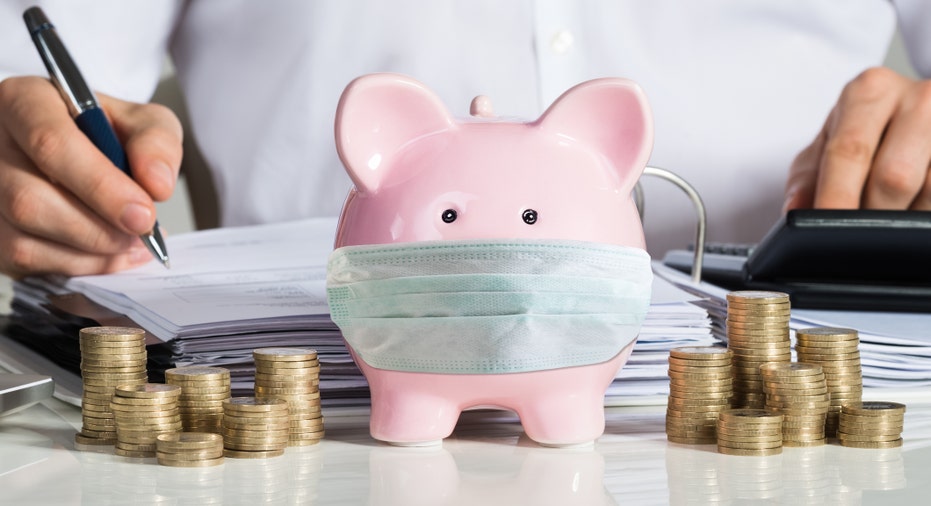5 smart money moves to make while you quarantine during coronavirus

Stuck at home? Try these personal finance tips during coronavirus to improve your money health. (iStock)
The coronavirus pandemic has made its presence felt across American households financially as job losses continue to mount. With the number of people filing for unemployment at 42 million people and counting, there's no doubting the importance of a financial plan for managing your money.
For example, you may be looking for ways to cut costs and get your finances in shape ahead of a potential recession. Following these personal finance tips during coronavirus can help with fine-tuning your spending and savings plan.
Refinance your loans
In response to the economic impacts of the coronavirus pandemic, the Federal Reserve opted to slash interest rates. That could be a good thing if you owe private student loans or a mortgage.
Private student loan refinancing and mortgage refinancing could help you secure lower interest rates while potentially reducing your monthly payments as well. Lower interest rates mean more money saved over the life of your loan.
Before refinancing, it's helpful to check your credit score to get a feel for the range of rates you might qualify for. Once you've done that, you can use a site like Credible to compare interest rates for student loan refinancing and mortgage refinancing. It's a simple way to view rates from different lenders in one place and make choosing a lender easier.
Compare student loan refinancing rates from multiple lenders now by inserting your information here.
Compare mortgage refinancing rates from multiple lenders now by inserting your information here.
EVERYTHING YOU NEED TO KNOW ABOUT MORTGAGE REFINANCE
Consolidate credit card debt
Though interest rates are down overall, you may still be stuck with a high annual percentage rate on one or more of your credit cards. Consolidating those debts could help further your savings plan if you're able to secure a lower rate.
There are two ways you can approach credit card debt consolidation. You could transfer high-interest debts to a new card with a zero percent introductory APR. Or you could take out a low-interest rate unsecured personal loan to pay your cards off. You can easily get prequalified for personal loans and compare rates in minutes, with no hard credit check required.
CAN YOU GET A PERSONAL LOAN WITHOUT A CREDIT CHECK?
Keep in mind that opening a new credit card or applying for a personal loan could knock a few points off your credit score. Also remember to factor in balance transfer fees or loan origination fees, along with the interest rate, to determine which option makes the most sense financially.
Cut down on expenses
Reducing expenses can be one of the most impactful personal finance tips during coronavirus. When you have less income it only makes sense to balance that out with less spending.
Take a close look at your monthly expenses. First, look for costs you can get rid of altogether because you aren't using them. A gym membership, for example, likely isn't a necessary expense right now since many states have yet to give them the green light to reopen. Next, go over your remaining expenses a second time to see what can be reduced.
CALCULATE YOUR DEBT-TO-INCOME RATIO AND FIND OUT WHERE YOU STAND
Calling your car insurance company, for example, could result in a lower premium if you're reducing coverage or bundling your policy with your homeowner's insurance. Or you may be able to take a temporary break from making mortgage payments.
Even reducing your spending by a few dollars here and there could add up to a decent amount of money you could funnel into your savings plan.
Work on building a savings account
Having an emergency fund means you have a financial safety net for unexpected situations, such as the coronavirus pandemic. If you don't have savings in place, consider what you can do to get one started.
Opening a high-yield savings account, for example, is a good way to capitalize on higher interest rates for savings. And online banks may charge fewer fees to save compared to traditional banks.
Next, you'll need to find money in your budget to save. During these times when money is tight, even a small amount, such as $10 or $20 a week, can be a good starting point.
Automating deposits into savings weekly or monthly can help you grow your money over time. Once your income gets back to a normal range, you can reevaluate your budget again to see if you can increase the amount you save.
Create a financial plan
While you may be focused on what's happening with your financial life right now, don't forget to consider your long-term money goals. Those might include paying off all of your debt other than your mortgage, saving for a comfortable retirement or putting aside money to help your children pay for college if you're a parent.
HOW DOES DEBT CONSOLIDATION AFFECT YOUR CREDIT SCORE?
Once you know what your goals are, consider how they should be prioritized. For instance, you may want to focus on debt repayment first, then retirement. But delaying retirement could cost you years of growth so you may need to find a way to balance those goals simultaneously.
Look at the bigger financial picture and use that as a guide for establishing a timeline and action plan for achieving your goals. And remember to review your financial plan and goals every six months to a year to make sure you're on track to reach them.



















